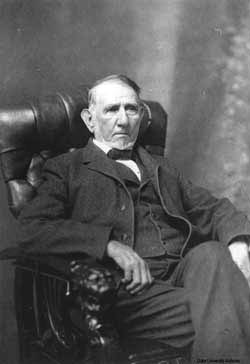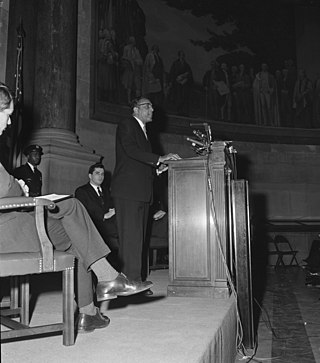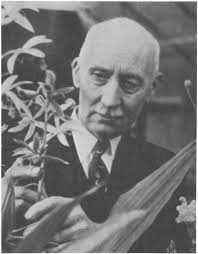Related Research Articles

Washington Duke was an American tobacco industrialist and philanthropist. During the American Civil War he enlisted in the Confederate States Navy. In 1865, Duke founded the "W. Duke, Sons & Co.", a tobacco manufacturer that would be merged with other companies to form conglomerate American Tobacco Company in 1890.
Black History Month is an annual observance originating in the United States, where it is also known as African-American History Month. It has received official recognition from governments in the United States and Canada, and more recently has been observed in Ireland and the United Kingdom. It began as a way of remembering important people and events in the history of the African diaspora. It is celebrated in February in the United States and Canada, while in Ireland and the United Kingdom it is observed in October.

Carter Godwin Woodson was an American historian, author, journalist, and the founder of the Association for the Study of African American Life and History (ASALH). He was one of the first scholars to study the history of the African diaspora, including African-American history. A founder of The Journal of Negro History in 1916, Woodson has been called the "father of black history." In February 1926, he launched the celebration of "Negro History Week," the precursor of Black History Month. Woodson was an important figure to the movement of Afrocentrism, due to his perspective of placing people of African descent at the center of the study of history and the human experience.
James Shepherd Pike was an American journalist and a historian of South Carolina during the Reconstruction Era.
The Association for the Study of African American Life and History (ASALH) is an organization dedicated to the study and appreciation of African-American History. It is a non-profit organization founded in Chicago, Illinois, on September 9, 1915, during the National Half Century Exposition and Lincoln Jubilee, as the Association for the Study of Negro Life and History (ASNLH) by Carter G. Woodson, William B. Hartgrove, George Cleveland Hall, Alexander L. Jackson, and James E. Stamps, and incorporated in Washington, D.C., on October 2, 1915,. The association is based in Washington, D.C. In 1973, ASNLH was renamed the Association for the Study of Afro-American Life and History.

Charles Harris Wesley was an American historian, educator, minister, and author. He published more than 15 books on African-American history, taught for decades at Howard University, and served as president of Wilberforce University, and founding president of Central State University, both in Ohio.
Timothy B. Tyson is an American writer and historian who specializes in the issues of culture, religion, and race associated with the Civil Rights Movement. He is a senior research scholar at the Center for Documentary Studies at Duke University and an adjunct professor of American Studies at the University of North Carolina.
The Journal of African American History, formerly The Journal of Negro History (1916–2001), is a quarterly academic journal covering African-American life and history. It was founded in 1916 by Carter G. Woodson. The journal is owned and overseen by the Association for the Study of African American Life and History (ASALH) and was established in 1916 by Woodson and Jesse E. Moorland. The journal publishes original scholarly articles on all aspects of the African-American experience. The journal annually publishes more than sixty reviews of recently published books in the fields of African and African-American life and history. As of 2018, the Journal is published by the University of Chicago Press on behalf of the ASALH.
Ira Berlin was an American historian, professor of history at the University of Maryland, and former president of Organization of American Historians.

The Coleman Manufacturing Company (1897–1904) had the first cotton mill in the United States owned and operated by African Americans. Organized in 1897 by Warren Clay Coleman and others, and operating under original leadership until 1904, it was located in the Piedmont area about two miles from the county seat of Concord, North Carolina in Cabarrus County. Textile manufacturing had been established here before the American Civil War, but the mills hired only white industrial workers. The Coleman property later became part of Franklin Cotton Mills and a Fieldcrest Cannon plant.
John David Winters was an American historian at Louisiana Tech University in Ruston, Louisiana. He is known for his monograph The Civil War in Louisiana, which was published in 1963, released in paperback in 1991, and is still in print. When published, it was the first and only single volume history covering events in Louisiana from 1861-1865.
Joseph John Spengler was an American economist, statistician, and historian of economic thought. A recipient of the 1951 John Frederick Lewis Award of the American Philosophical Society and the 1981 Distinguished Fellow Award from the History of Economics Society, he was Professor Emeritus of Economics at Duke University at the time of his death.

Mary Duke Biddle Trent Semans was an American heiress, activist, politician, and philanthropist. She was the granddaughter of Benjamin N. Duke and the great-granddaughter of Washington Duke, both tobacco and energy tycoons who helped start Duke University. Semans is remembered for her support and work towards promoting the arts and humanities through various philanthropic entities.
Black Wall Street was the hub of African-American businesses and financial services in Durham, North Carolina, during the late 1800s and early 1900s. It is located on Parrish Street. It was home to Mechanics and Farmers Bank and North Carolina Mutual.
The following is a timeline of the history of the city of Durham, North Carolina, USA.
The Negro and Fusion Politics in North Carolina, 1894–1901 is a 1951 book by African American scholar Helen G. Edmonds.

Hugo Leander Blomquist was a Swedish-born American botanist. His well rounded expertise encompassed fungi, bacteria, bryophytes, algae, grasses, and ferns. The standard author abbreviation H.L.Blomq. is used to indicate this person as the author when citing a botanical name.
Earlie Endris Thorpe was a professor of history, an author, and clergyman in the United States. He lived in Durham, North Carolina and was a professor at North Carolina Central University for about 27 years. Duke University has a collection of his papers and correspondence.
William Baskerville Hamilton was a historian at Duke University who focused on the history of the American South and of Great Britain. He was assistant managing editor of little magazine South Atlantic Quarterly from 1956, and managing editor from 1958 until just before his death in 1972.
Nathan Carter Newbold was the Director of African-American education in the North Carolina State Department of Public Instruction from 1913-1950. Duke University has a collection of his papers.
References
- ↑ Obituary The News & Observer March 6, 2016
- ↑ "Robert F. Durden *52". Princeton University.
- ↑ "Dr. Robert Durden - Museum of Durham History".
- ↑ "Robert F. Durden Reference collection, circa 1965-2001 - Archives & Manuscripts at Duke University Libraries". David M. Rubenstein Rare Book & Manuscript Library.
- ↑ "Robert F. Durden – The Historical Society of North Carolina".
- ↑ "Duke Flags Lowered: Longtime Duke Historian Robert Durden Dies at Age 90". today.duke.edu.
- ↑ Wall, Bennett H. "The Dukes of Durham, 1865–1929. By Robert F. Durden. Durham, N.C. Duke University Press, 1975. Pp. Xiv + 295. $9.75". Business History Review. 51 (1): 122–124. doi:10.2307/3112939. JSTOR 3112939. S2CID 155249242.
- ↑ Harper, C. W. (July 1, 1973). "Robert F. Durden, The Gray and the Black: The Confederate Debate on Emancipation". The Journal of Negro History. 58 (3): 369–370. doi:10.2307/2716788. JSTOR 2716788 – via journals.uchicago.edu (Atypon).
- ↑ Sparks, David S. (1966). "Book Review: The Climax of Populism: The Election of 1896, by Robert F. Durden". Pennsylvania Magazine of History and Biography: 555–557.
- ↑ "Durden, Robert Franklin [WorldCat Identities]".